As migrant crisis overwhelms state, volunteerism and funding dwindle for Afghans

DENVER — Inside a gated community of townhouses in south Denver, a group of 10 homeowners gathered around a table to discuss the types of topics you might expect at any neighborhood meeting: internet issues, finances and an upcoming dinner celebration.
But this was no ordinary homeowner’s meetup of rabble-rousing neighbors — instead the group was discussing how to assist a young Afghan couple who arrived to Denver in December.
Over the past two plus years, the Cherry Hills III neighbors have sponsored and mentored three Afghan families who have settled in Denver to restart their lives.
“They have left everything and everyone behind. They may or may not ever see their parents and grandparents again,” said Suzanne Rosenthal, one of the volunteer group members. “We're like their adopted family — that is really how we feel.”
Nearly every day, at least one of the 13 volunteers drives the arrivals to doctor’s appointments, takes them grocery shopping, trouble shoots their internet, edits resumes, selects furniture — or simply shows off the city’s sights like the Denver Botanic Gardens and Denver Zoo.
As Colorado reckons with a migrant crisis coming from the southern border — more than 40,000 migrants in Denver alone since December 2022 many from Venezuela — there’s another group new to the state who are perhaps less visible: Afghans.
Volunteers like Rosenthal fill in the gaps transitioning the new arrivals to life in Colorado, but the pool of volunteers, much like the pool of funds, has dwindled even as the need remains.
Since 2017, Afghans have represented Colorado’s largest group receiving resettlement services, according to data from the Colorado Refugee Services Program. Unlike the migrants coming across the border — who hope to gain asylum in the U.S. — most of the arriving Afghans have been extensively vetted and approved to reside here prior to their arrival.
The largest wave of Afghans — about 2,700 — came to Colorado between October 2021 and September 2022 following the withdrawal of U.S. troops from the country and the subsequent return of the Taliban, the Islamist fundamentalist group. Under the Taliban, Afghanistan’s economy has floundered and women have largely been banned from working and public life.
Afghans continue to resettle in Colorado in large numbers relative to other refugee communities — almost 1,000 immigrated in 2023, though refugee resettlement organizations say they have received dwindling volunteer and financial support since the big wave arrived a few years ago.
Different pathways to settling in the U.S.
Most Afghans come to the U.S. through one of three legal pathways: as refugees, special immigrant visa (SIV) holders, or humanitarian parolees (after which they may apply for asylum).
Faisal, 27, and his wife Sweeta, 30, who did not wish to use their last names to protect the safety of their family in Afghanistan , came to Denver in December 2023 on a Special Immigrant Visa (SIV).
“We applied in 2020,” Faisal said. “There are some people we know that applied with us, but they are still in Kabul.”
SIVs grant permanent residency to Afghans and Iraqis who aided the U.S. government during the country’s military operations in the region.
SIV holders are eligible for the same services as refugees including cash assistance, housing assistance, medical assistance, employment preparation, job placement and English language training. While refugees must apply for green cards (legal permanent residency) one year after their arrival, SIV holders automatically receive them in the mail.
Sweeta, who has a college degree in agricultural biotechnology, worked in Kabul for the USAID Promote program, a leadership and training initiative run by the U.S. government aimed at helping Afghan women advance their careers.
She later went on to work with the Agriculture Research Institute of Afghanistan (ARIA) until the Taliban came into power.
For several months before the Taliban took over, her husband Faisal had been doing administrative work in a guest house for Americans.
“If they [the Taliban] know you have a connection with the Americans, they beat you,” he said.
After a year and a half of unemployment following the Taliban’s return to power, Faisal became an auditor for Grand Thorton, an audit firm based in the U.K., before he and Sweeta were approved to move to the U.S.

Sweeta and Faisal had to leave behind their five cats in Afghanistan. A friend in Denver gave them this ornament.
Photo: Andrea Kramar, Rocky Mountain PBS
Getting to the United States was an ordeal.
They first crossed into neighboring Pakistan, after paying off two border agents, and pretended to have a wedding. They brought little with them so the Taliban wouldn’t become suspicious, and left behind, among other items their computer and five cats.
After a day in Kuwait, they went to Qatar for their United States visa to be processed, then on to Chicago and finally to Denver, where they had an Afghan friend living.
Sweeta’s parents and siblings were also able to take refuge abroad in the United Kingdom because her father worked with the British military.
Faisal’s family remains in Afghanistan and hasn’t been approved to resettle elsewhere. Most of his relatives remain jobless, and his brother has been beaten multiple times by the Taliban, one time so much so that “blood came out from his eyes,” said Faisal.
Another Afghan couple in Denver, Bibi and her husband Sayed (who requested RMPBS use their nicknames to protect their identities and families left behind in Afghanistan), fled Afghanistan and came to the U.S. during the big wave of Afghan evacuations under the U.S. State Department’s Operation Allies Welcome program.
Just 11 days following the 2021 return of the Taliban, the couple, along with their two-year-old-son and two-week-old daughter, evacuated the country. After brief stopovers in Qatar and a refugee camp in Germany, they came to the U.S. through a pathway called humanitarian parole.
Parole provides temporary entry into the U.S. for urgent humanitarian reasons. While most parole is one year, Afghans can remain for up to two years. Unlike under refugee or SIV status, however, humanitarian parole does not provide permanent status. Parolees can apply for asylum which, if granted, allows them to apply for lawful permanent residence and citizenship after five years .
Before 2021, Bibi was a librarian at the American University of Afghanistan in Kabul. When the Taliban took over, she said she began receiving threatening calls.
“They were saying, ‘Hey Bibi, why are you not coming to the university anymore?’ I was so scared,” she said.
She said the Taliban had all her information, including her home address.
Her husband, who was working as a criminal detective at the time, received similar calls and went into hiding with family until he could flee the country with Bibi and their children.
“We worked and we built our life in Afghanistan, and in just one night, everything was gone,” Bibi said.
The family applied for asylum once they arrived in the U.S. and were granted status this March, giving them legal permanent residency and putting them on a path towards citizenship.
It should be noted that while some Afghans are in the U.S. under humanitarian parole, SIV status, or as refugees or asylees, most displaced Afghans living outside their home country are in neighboring Pakistan and Iran.
Refugee numbers vary from year to year — and go up or down according to presidential administrations
Every year since the passage of the Refugee Act of 1980, the president, in consultation with Congress, decides how many refugees to admit and from which regions of the world. The ceiling was the highest in 1980 and 1981 and again in the early 1990s.
During President Donald Trump’s administration, the numbers dipped to the lowest levels in the history of the program — to a total of 18,000 in 2020. Biden increased the numbers to 62,500 in 2021 and to 125,000 in 2022 and 2023.
But the actual number of refugees resettled under the Biden administration has been lower than the ceiling, said Michelle Mittelstadt, Director of Communications and Public Affairs at the Migration Policy Institute.
“That was in part because of the pandemic, but also in significant part because of the very sharp cuts to the resettlement program that were undertaken in the Trump administration,” Mittelstadt said.
“You had affiliates across the United States that went dark. They closed their offices and laid off their staff. Once you've done that, you don't restart capacity overnight.”
Throughout most of U.S. history, refugee ceilings and actual numbers of refugees who settle in the country had been closely aligned.
Since the deep Trump administration cutbacks, however, the ceilings and actual numbers of refugees arriving to the country have diverged quite a bit.
For example, only about 25,000 refugees in 2022 and about 60,000 in 2023 settled in the U.S., despite the Biden administration’s 125,000 cap.
“You've seen a slow ramping up as reception capacity has come back online with the [resettlement agency] affiliates,” said Mittelstadt.
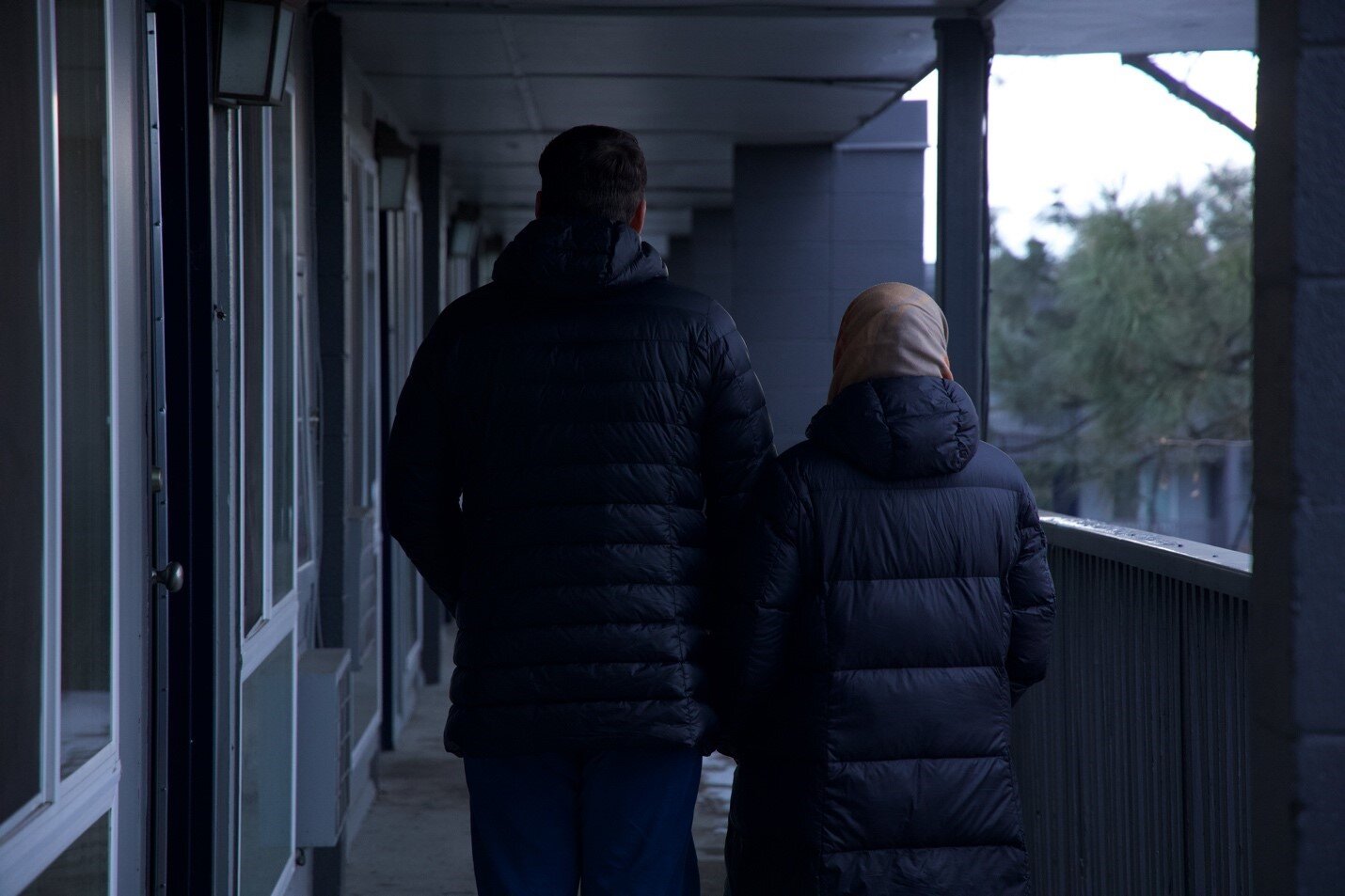
Unlike refugee allocations, the number of special immigrant visas is determined by Congress. Congress set the initial cap in 2014 but has raised it almost every year since.
The cap determined by Congress in 2022 authorized a total of 38,500 SIV holders for applicants coming from Afghanistan. Authorities expected the cap to be met by the end of 2024 — when there would only be 8,000 slots left — but Congress approved an additional 12,000 SIVs for Afghans in March.
The process for deciding where arrivals go is akin to the ‘NBA Draft’
Everyone approved for admission to the U.S. is sponsored by one of 10 nonprofit resettlement agencies in the U.S. — each of which have affiliates in the 50 states to carry out the work of placement and resettlement.
In Colorado, there are four nonprofits carrying out these services: Lutheran Family Services Rocky Mountains, the International Rescue Committee (IRC), the African Community Center (ACC) and the newest authorized resettlement agency, Jewish Family Service of Colorado (which opened up refugee services again after decades of keeping its program dormant in response to the wave of Afghan new arrivals following the return of the Taliban).
The process for determining where refugees resettle in the U.S. is akin to the NBA draft, said Troy Cox, director of refugee resettlement at Jewish Family Service of Colorado.
“There's allocation meetings once or twice a week between the 10 national resettlement agencies,” he said. “It’s just kind of a back and forth of who can take who and what states have the ability. People are picking and choosing.”
The national resettlement agencies primarily consider the capacity of their state affiliates. Allocations are also decided based on the availability of jobs and affordable housing.
Refugees who have family or friends in a particular state, known as U.S. ties, will typically be allocated to that state. Refugees are also placed in areas where there are already existing members of their nationality to assist in the integration process.
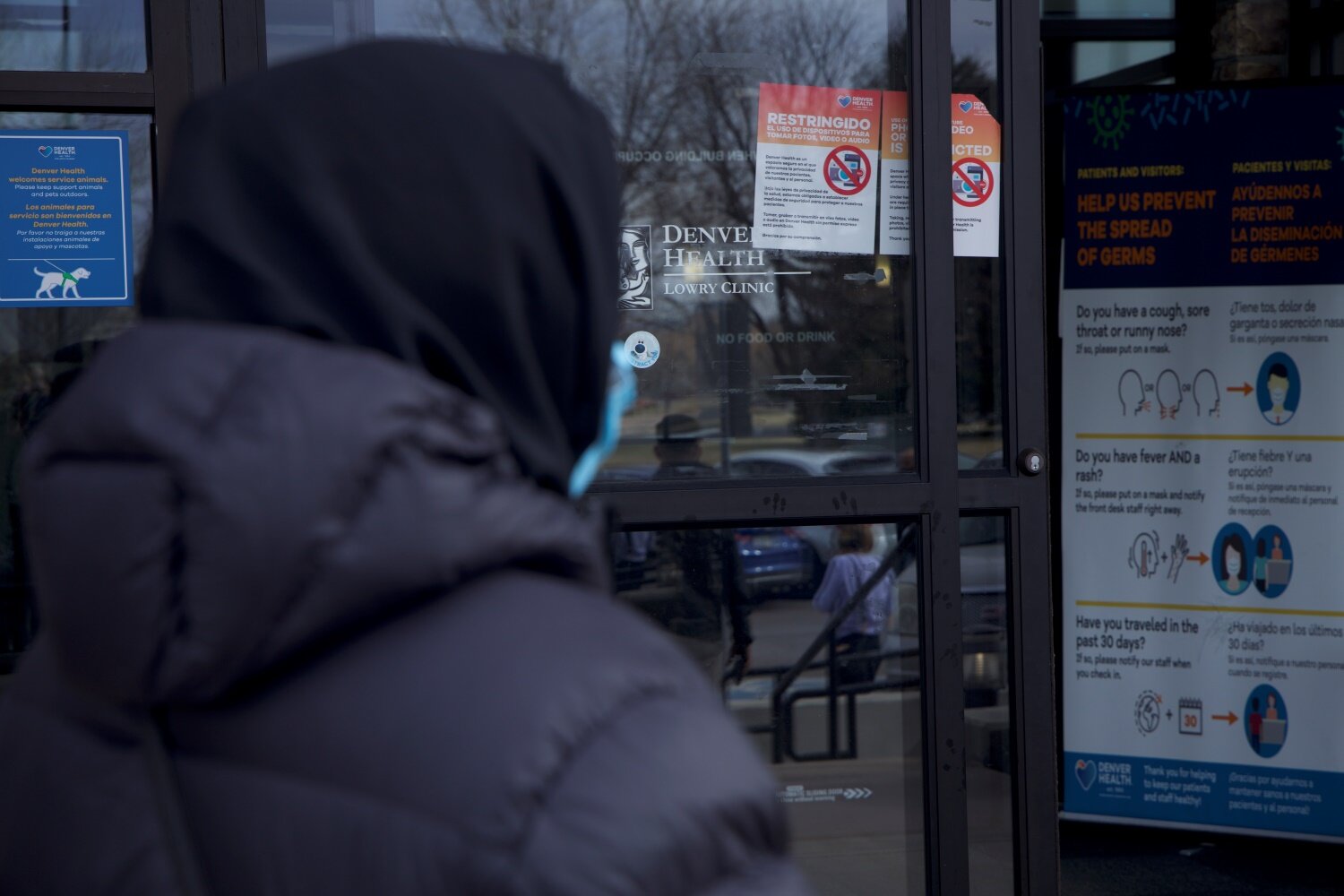
While the politics of one state aren’t a large determining factor, they can occasionally play a role.
In August 2021, the governors of South Dakota and Wyoming, both Republican, refused to welcome Afghan evacuees, citing security risks and a lack of interest.
“You’ve had backlashes in red states, in particular, against refugee resettlement. You've had governors who complained loudly that they were not being notified in advance of the numbers of refugees coming in and where they were being resettled,” said Mittelstadt of the Migration Policy Institute.
To date for fiscal year 2024, Texas, California and New York have taken in the most refugees. Texas leads the way, welcoming 3,300 refugees from around the world.
The states that have taken in the most Afghan refugees and SIV holders so far this year have been Texas, California and Virginia. Compared to the other states, Colorado comes in 18th for all refugee arrivals, 9th for Afghan refugee arrivals, and 7th for Afghan SIV holders.
Welcome to America. Now you’re on your own.
The local resettlement affiliates are responsible for a variety of tasks after new arrivals get to their destinations. These include receiving the new arrivals at the airport, finding housing, conducting cultural orientations, helping with job placement, enrolling kids in school, teaching them how to use public transit, and signing them up for food stamps and social security.
Each individual eligible for resettlement assistance receives $1,325 in federal money for reception and placement for the first 90 days — the bulk of which goes to rent and typically gets used within a month or two.
New arrivals also receive cash assistance for a maximum of 12 months. Beyond that, the nonprofit resettlement agencies work to provide additional assistance until the newcomers are self-sustaining and employed.
The support given to refugees in the U.S. is of relatively short duration, said Mittlestadt. Refugee medical assistance and refugee cash assistance usually last for about three months whereas in Europe, assistance can last many months and even years, she said.
“The U.S. has always enshrined self-sufficiency within the refugee resettlement program and the expectation that refugees will become self-sufficient quickly after arrival,” said Michelle Mittelstadt. “That’s both for cost reasons, but it's also sort of a means of speeding integration outcomes.
In practice, this means that the resettlement nonprofits work to place their clients in jobs and permanent housing within about three months.
Resettlement agencies are facing dwindling numbers of volunteers and funding
“Last year and the year before, there was more money that was allocated for Afghans, but that is significantly less now,” said Jamie Koehler Blanchard, program director of the refugee and asylee programs of Lutheran Family Services Rocky Mountains.
“Right after the evacuation [in 2021], we had a lot of money to be able to assist people with rent, but that just isn't the case anymore. So, we're having to dial it back. And it's hard because the cost of living, of course, hasn't gone down,” she said.
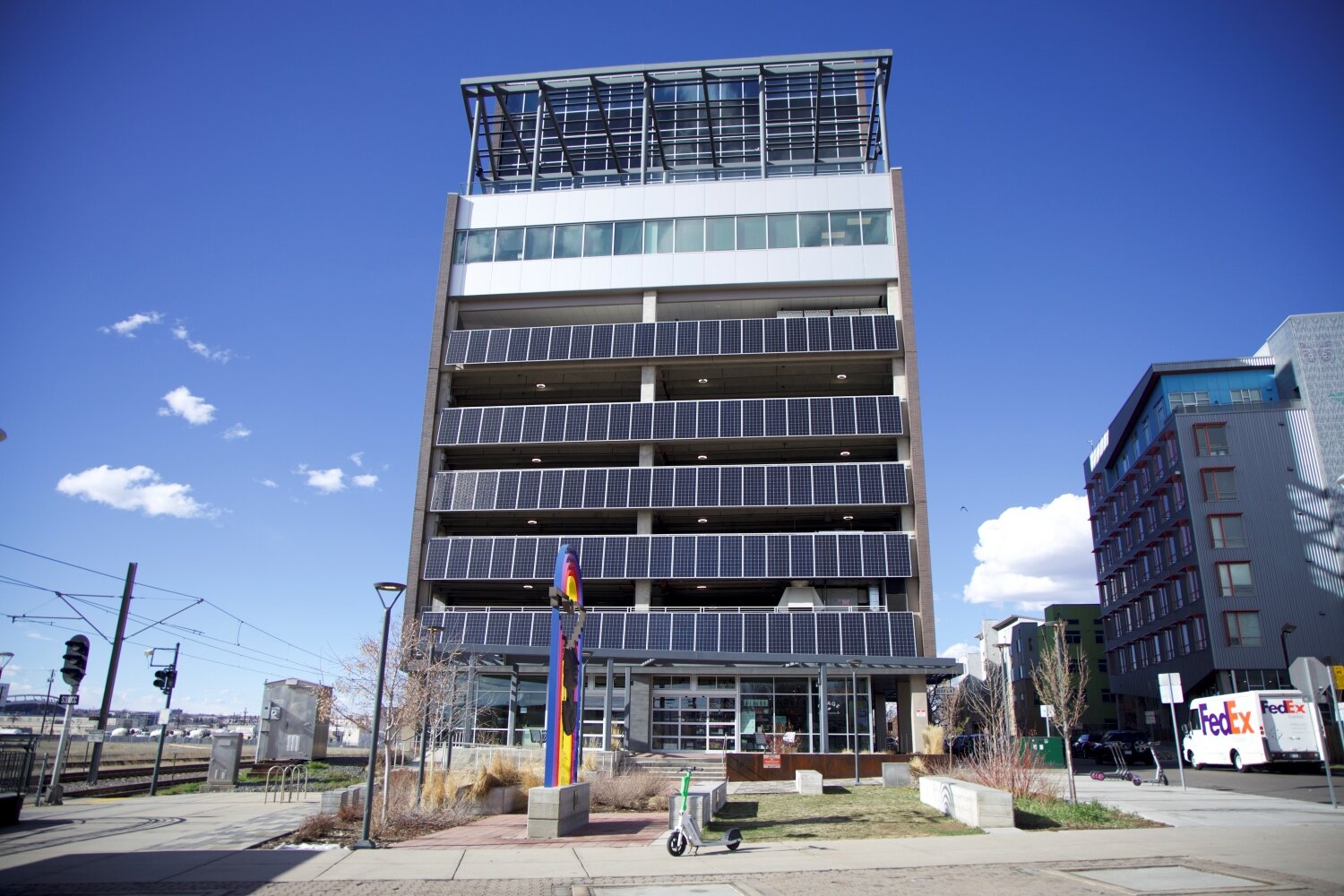
Lutheran Family Services Rocky Mountains office in Denver.
Photo: Andrea Kramar, Rocky Mountain PBS
During the wave of evacuees coming in 2021, the resettlement agencies received an injection of funds from the federal government earmarked for Afghan arrivals that could be allocated toward housing, services, programming and other areas.
During that time, private funding for relocating Afghans — both cash and in-kind donations — and volunteerism were also up. Compared to other populations eligible for resettlement support, Afghans received comparatively more funding and support than other populations, said Ron Buzard, managing director of the African Community Center (ACC).
“It’s created a huge disparity in terms of resettlement because we continue to serve refugees from other countries as well, and the funds have not been there for them,” he said.
Today, even though Afghans continue to arrive to the state in large numbers, all that support has since dwindled, Buzard said.
“Those who are coming now are receiving fewer supports and fewer services,” he said. “It’s a very noticeable drop.”
Buzard said in 2021 and early 2022, ACC could cover up to 6 months of rent. Now it’s just a couple months.
It’s put greater pressure on getting Afghans employed quicker.
“There’s no way someone can arrive now and not make employment a priority in the first few months just simply because the resources are no longer there,” said Buzard. It’s a challenge, especially for those who speak limited English.
Because the needs of refugees are so great and there’s only so many caseworkers at the local resettlement offices, the organizations rely on volunteers to help integrate refugees into American society. But volunteerism is also down.
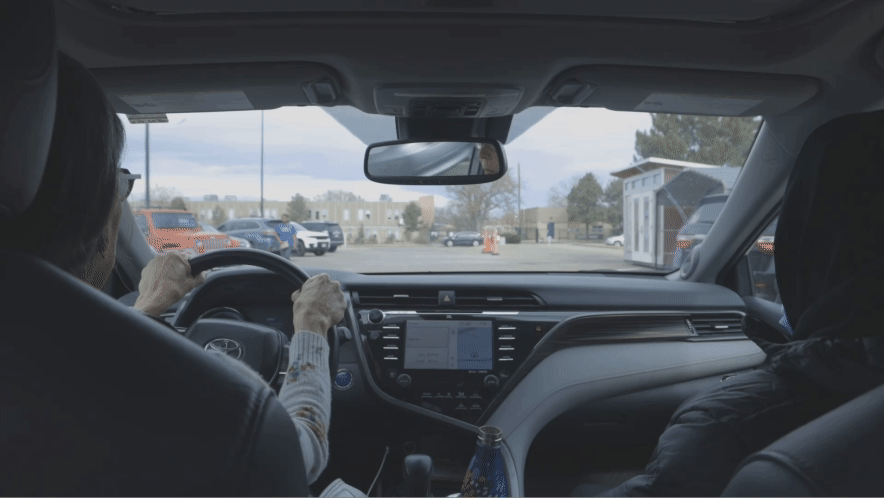
Rosenthal drove Sweeta to a doctor’s appointment in mid-March. After the appointment, she dropped Sweeta off at Mango House to take an English language class. Sweeta and Faisal don’t have a car and rely on public transportation or the help of volunteers.
Photo: Andrea Kramar, Rocky Mountain PBS
In fiscal year 2022, Lutheran Family Services was able to match about 60% of arrivals — mostly Afghans — in the Denver metro area with volunteers. In fiscal year 2023, 32% of arrivals had volunteers, and this year to date, only about 13% of new arrivals have been matched with volunteers.
African Community Center currently has 43 families on the waiting list hoping for a volunteer. Most of the families are Afghan.
“Our goal is to pair every refugee, every one of our clients that wants it, with a mentor or volunteer. But we have really never been able to have a large enough pool of volunteers to be able to do that,” said Blanchard.
“If there's a family that we think is going to need some additional support, like a single parent or a larger family, or a family that has children with specific medical needs, then we'll try and prioritize them,” she said.
Faisal and Sweeta asked Lutheran Family Services to be paired with volunteers when they first arrived. But with no children or significant medical needs, they were denied the request.
Two months after their arrival, their friends Angiza and Omid introduced them to Suzanne Rosenthal and her volunteer group. Now Rosenthal’s group is helping Faisal and Sweeta independently, outside the supervision of Lutheran Family Services.
Marissa Greene, director of volunteer services at Jewish Family Service of Colorado said many potential volunteers have been reaching out to her agency hoping to help Venezuelan migrants.
But Venezuelans arriving at the border are typically not eligible for refugee resettlement services, so her agency is limited in what it can do.
“After we explain to potential volunteers the processes of the different pathways to come to America, most people do not go away [and sign up to volunteer with other populations in need],” she said, even if it’s not with Venezuelans.
Volunteers play a critical role in integrating refugees and helping them become financially stable
Suzanne Rosenthal and neighbors in her condo community began volunteering with Afghan refugee families two and a half years ago, at the height of the wave of Afghans fleeing to the U.S.
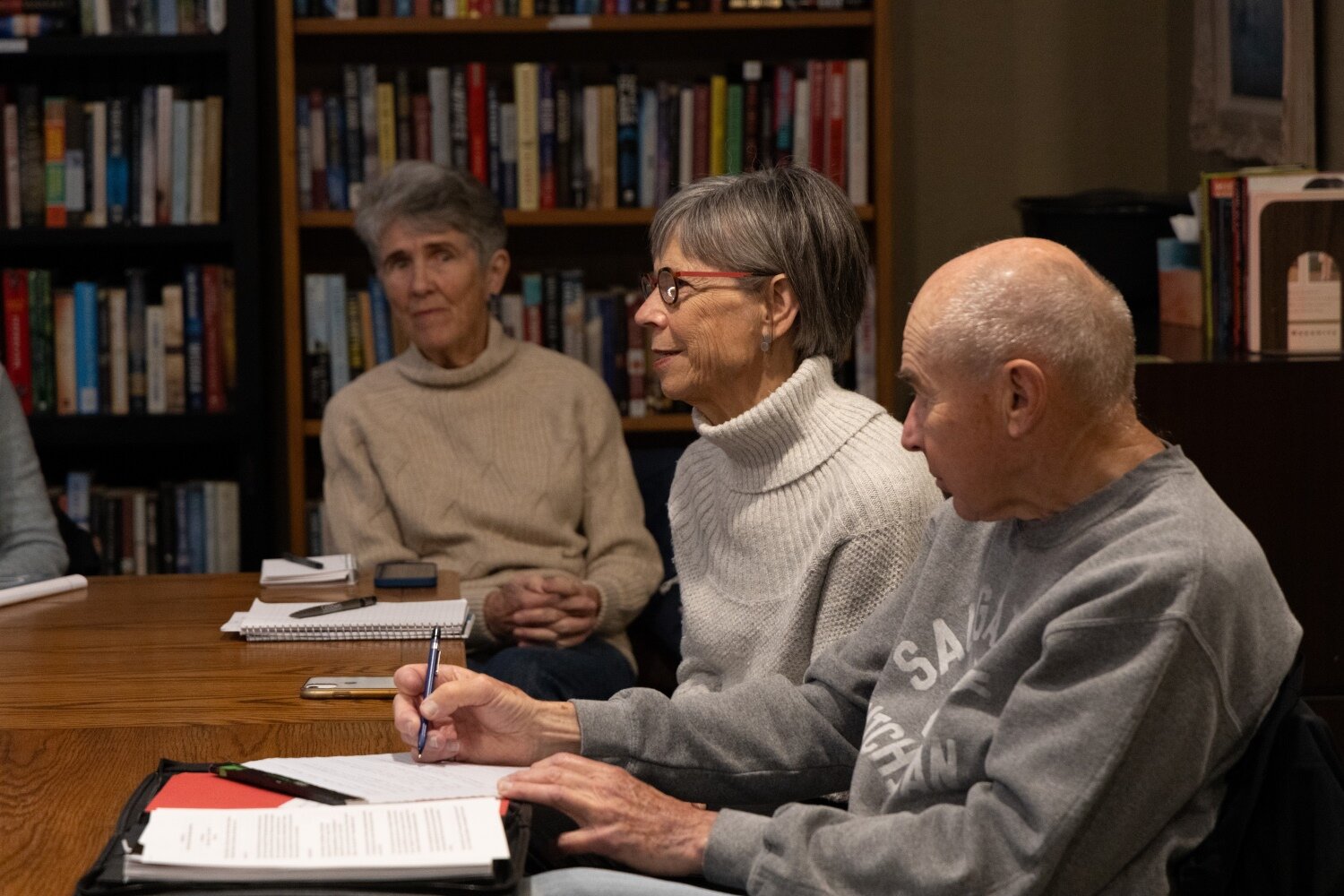
(Left to right) Volunteers Penny Trask, Suzanne Rosenthal and Dennis Hamann met at their condo complex in early March, along with seven other neighbors, to discuss the needs of Faisal and Sweeta at their monthly meeting.
Photo: Andrea Kramar, Rocky Mountain PBS
She and a few neighbors in her condo community came together and decided to help.
They’re now a group of 14 (some more actively involved than others), all retired, who meet at least once a month and regularly divvy up tasks over email and text.
They have worked with three Afghan refugee families to date: Bibi and Sayed, Angiza and Omid, and most recently, Faisal and Sweeta. The volunteer-mentors have hosted two Friendsgivings, a Fourth of July picnic, and a baby shower for Angiza, who welcomed her third child in March.
The group is also planning a dinner in April for Bibi and Sayed in honor of their new asylee status.
There is a lot to do, and the volunteer work is like a second job, albeit a gratifying one. They regularly collect donations from friends and neighbors, raise money to support the refugees’ housing (when needed), and are frequently driving the newcomers to various appointments. The original leader of the group, Judi Sempson, died suddenly last year of brain cancer and, in her honor, her daughter Sera is donating a lot of Sempson’s furniture to Faisal and Sweeta.
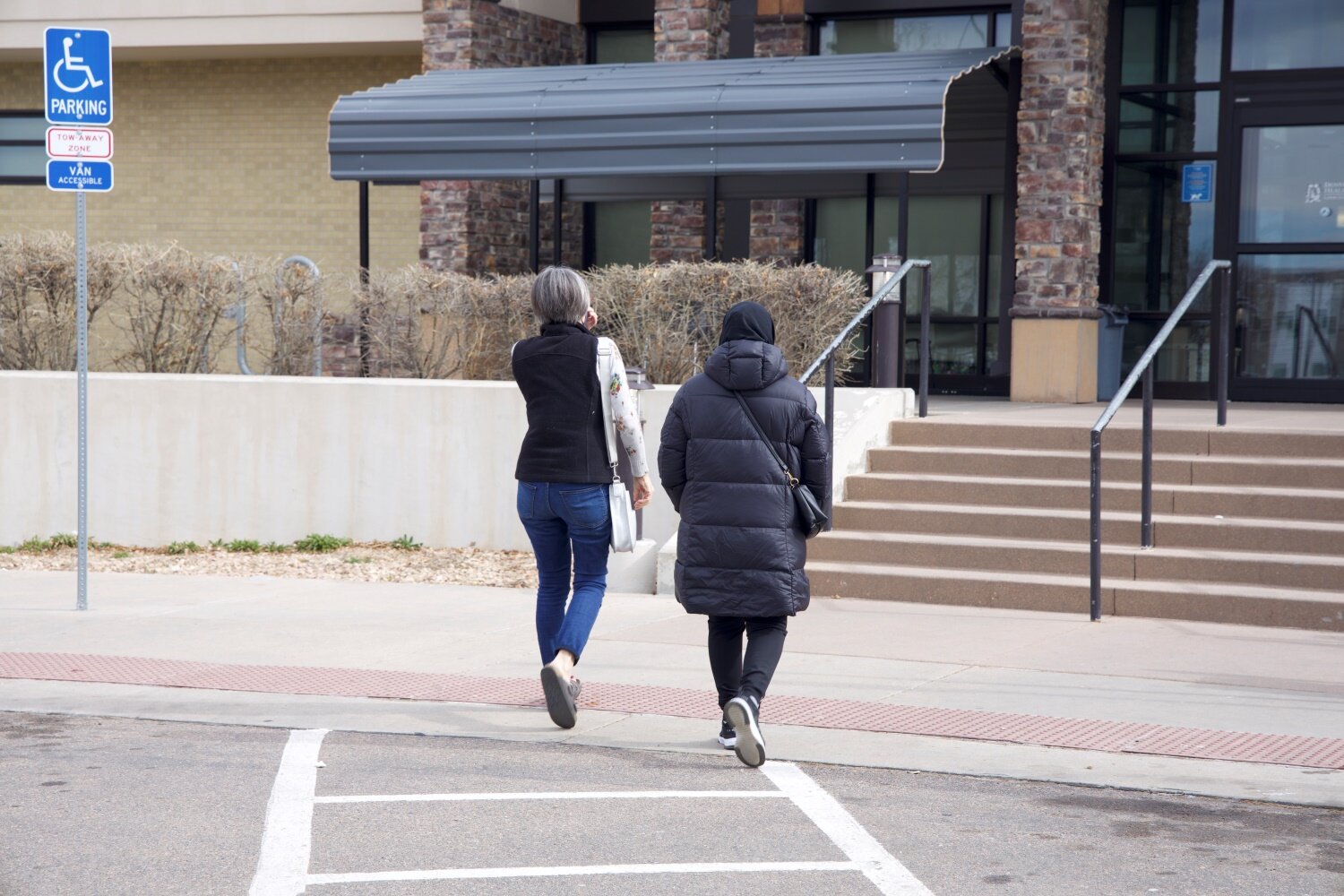
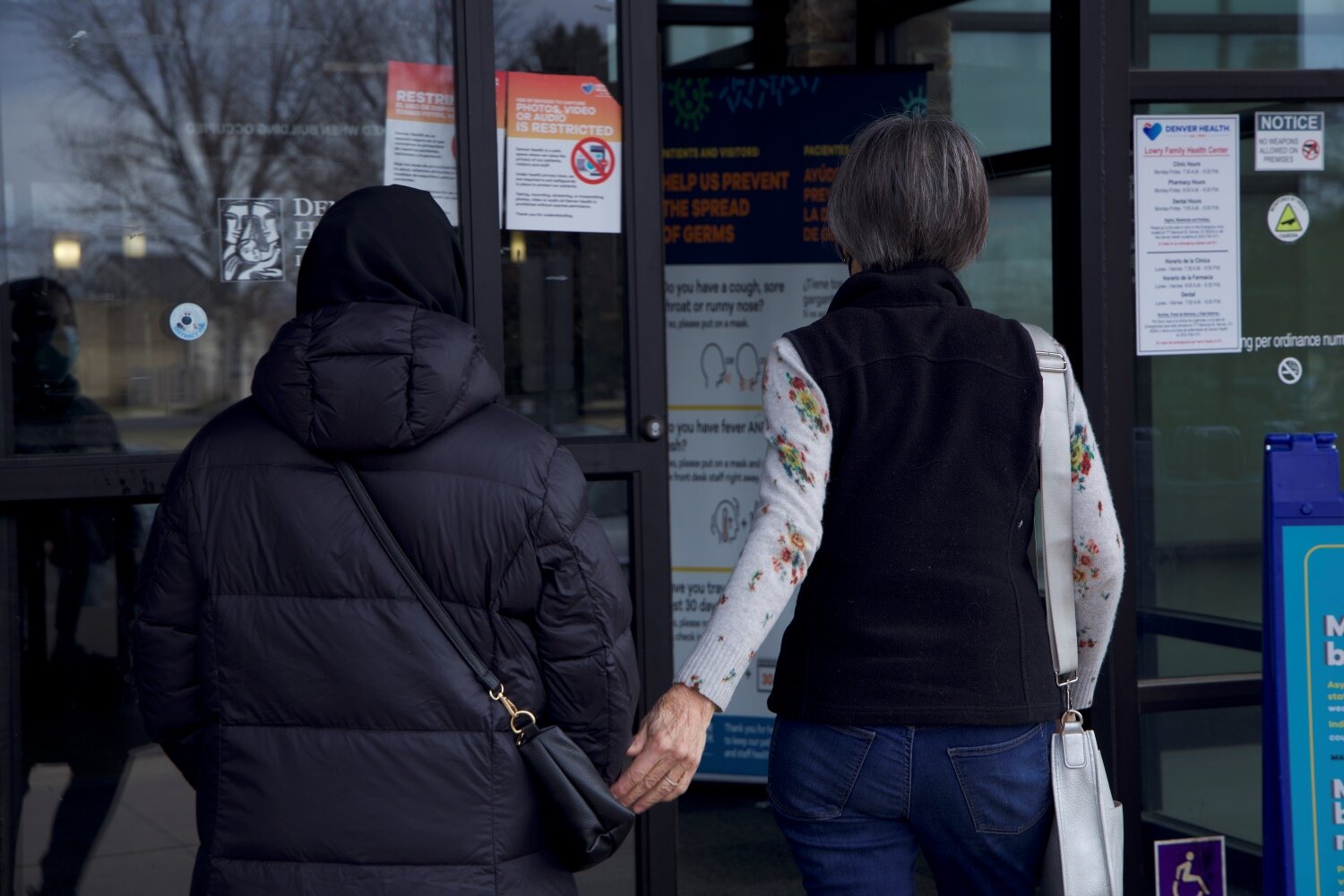
Volunteer Suzanne Rosenthal takes Sweeta for a check-up at Denver Health Center.
Photo: Andrea Kramar, Rocky Mountain PBS
“The kneejerk response for people is, ‘Look they’re so lucky to be here,’ or ‘We’re giving them everything.’ But they have left everything behind. They may as well have been dropped on another planet,” said Rosenthal. “Honestly, I don’t know what any of these folks would do without some sort of mentor group.”
Some members of the volunteer group have relevant backgrounds for certain needs. One volunteer, One volunteer, Kathy Magilvy was a professor of nursing, so she and her wife Ginger Beach, help with the majority.
Another member, Jeff Hansen has a truck, so he handles most of the furniture moves, and another member, Linda Darcy was a school principal and helped place Bibi’s now four-year-old son in an early childhood intervention program to help with his speech delay.
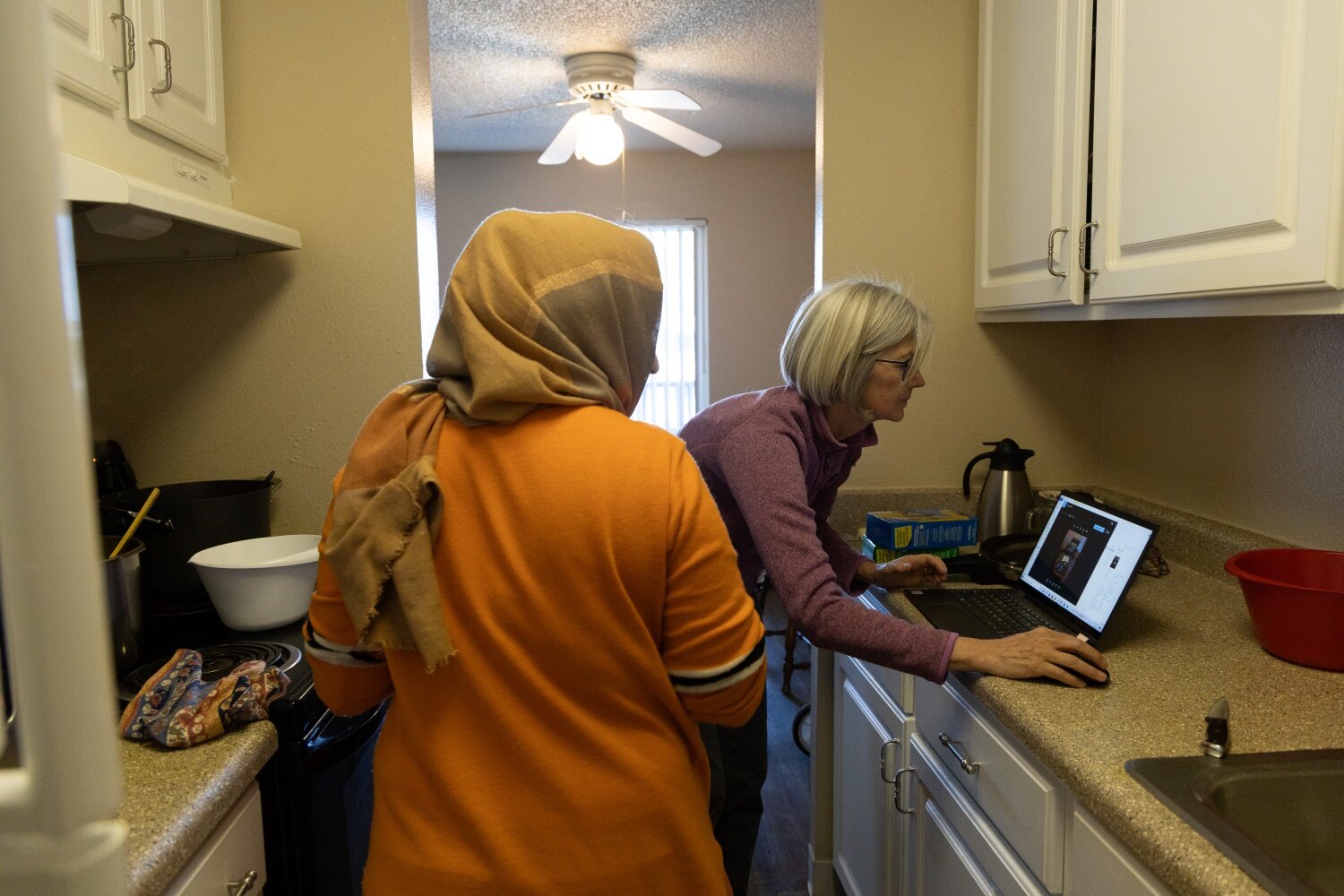
Volunteer Susan Geiser helps Sweeta pick out donated items to furnish the rest of her and Faisal’s one-bedroom apartment.
Photo: Andrea Kramar, Rocky Mountain PBS
Life is better in Colorado, but acclimating to a new reality is tough
Faisal and Sweeta arrived in early December — and they struggled to land jobs. Sweeta can’t speak much English and has been taking language classes at a cultural center called Mango House, but said the classes have gotten cancelled several times after one of the teacher’s resigned.
Up until early April, with no family around and few friends besides the volunteers (they are friends with Angiza and Omid and have also become friends with another Afghan couple in their apartment building), there hadn't been much for Faisal and Sweeta to do.
Sometimes when Faisal left the house, Sweeta would cry, longing for her family and a job to keep her occupied.
In late February, she suffered a miscarriage after three months of being pregnant with their first child.
“She was happy about the baby. She was always telling me that ‘I will be busy with he or she, I won’t feel so alone,’” Faisal said. “And now it’s hard for her every day.”
Faisal thought he landed a job at Denver International Airport and attended two days of training there but was later told — in a confusing set of circumstances — that he couldn’t have the job until he physically received his green card. He also attended a career fair at Emily Griffith Technical College where he hoped to land a front desk job at hotels but was told his English wasn’t good enough.
“I am under pressure to find a job. It’s not just a rent problem,” said Faisal. “My family still needs my support in Afghanistan. If I don't support them, nine members of my family, what will they eat for a month?”
Lutheran Family Services Rocky Mountains paid the $1,250 rent for their apartment their first three months — and the volunteers offered to pay April rent. Faisal worried about how the two would continue affording their home after that.
But the first week of April, he was offered a full-time job to serve as a security officer with Covenant Aviation Security at Denver International Airport. He said he will make $20/hour.
Then, in a week of good news, Sweeta also learned that she'd gotten a job working as a pre-school teacher at Temple Sinai in Denver, which has hired three other Afghan refugees to teach. Rosenthal and two other volunteers had helped her brush up her resume.
Despite the new jobs, Faisal worried about the cost of health insurance. Two of the volunteers had helped him calculate how much money he would have left over after paying the health insurance premiums from the new job, and it worried him.
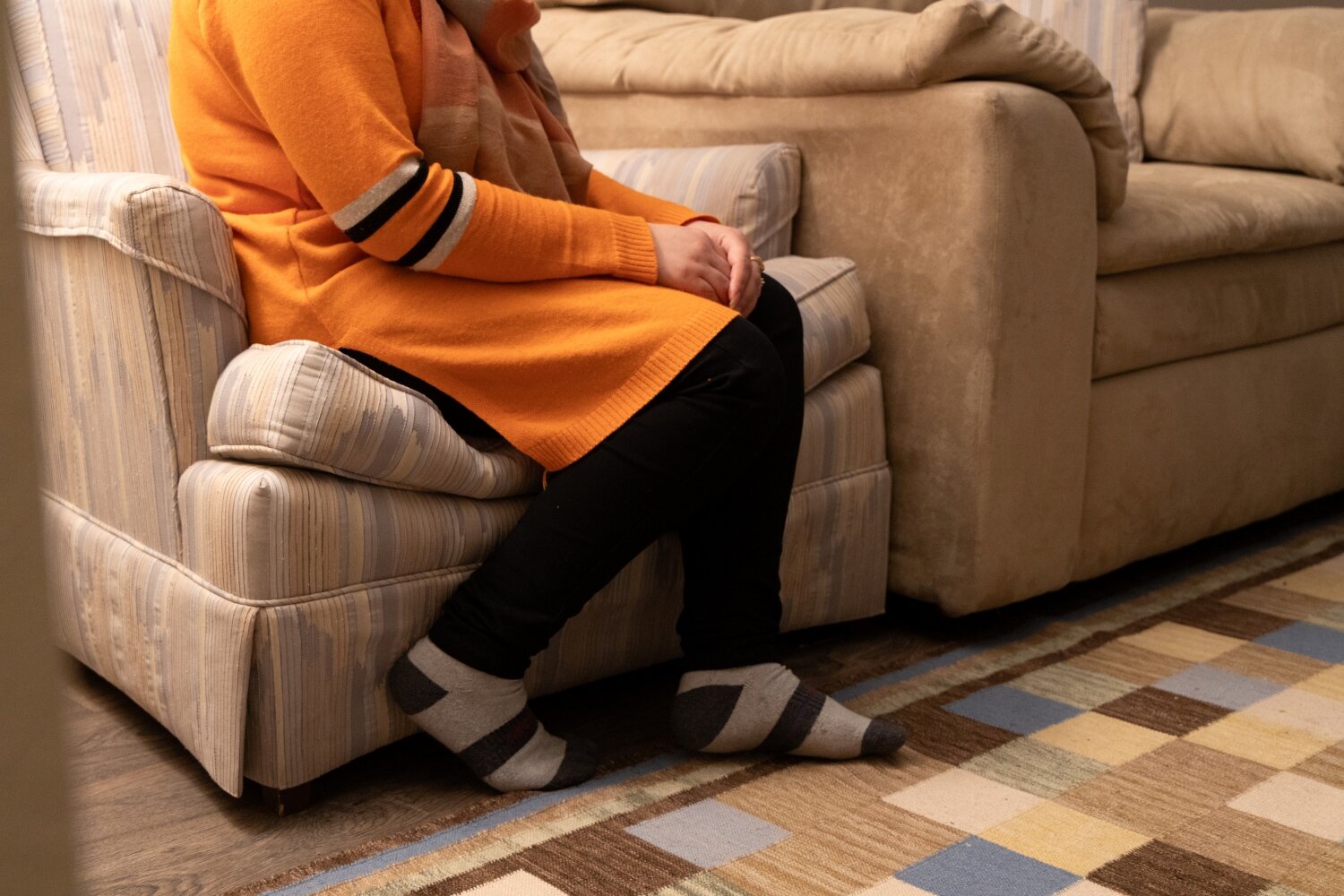
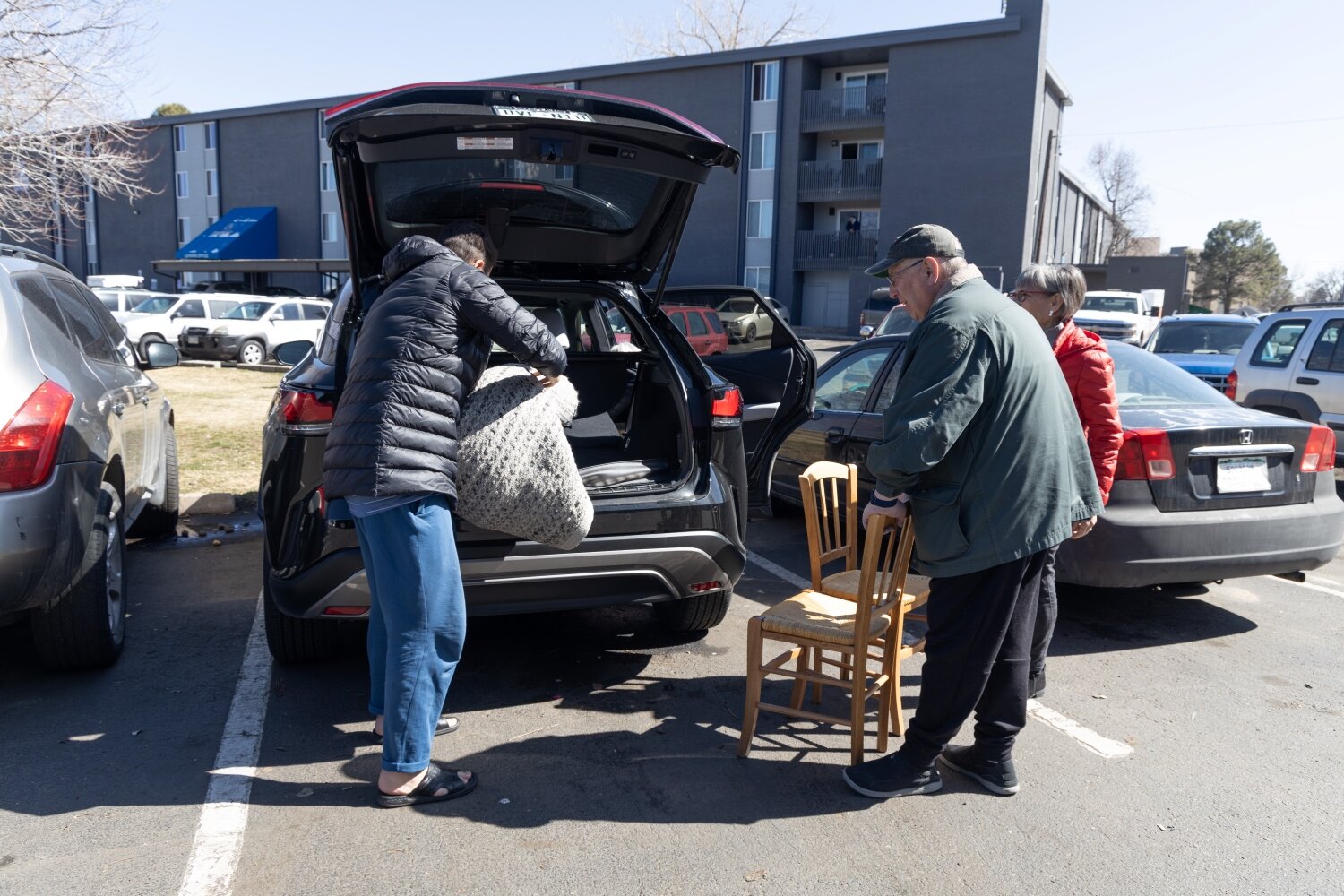
Volunteers Suzanne Rosenthal, Bob Mannis and Susan Geiser delivered a bike, sewing machine, chairs and a few rugs to Sweeta and Faisal in mid-March.
Photo: Andrea Kramar, Rocky Mountain PBS
Finally, they have started to make progress.
In mid-March, after the volunteers dropped off a carload of donations including a bike (Faisal and Sweeta don’t yet have a car), a sewing machine, a vacuum cleaner, a few chairs and two rugs, two of the volunteers stayed for lunch cooked by Sweeta.
The smell of spices filled the spare one-bedroom apartment as Sweeta hovered over the stovetop preparing a lunch of rice and chicken korma, along with homemade chutney and cut up Afghan bread from a nearby Hallal market.
Over lunch, Rosenthal and another volunteer, Bob Mannis, Sweeta and Faisal broke bread, smiled, laughed and asked questions about each other’s lives.
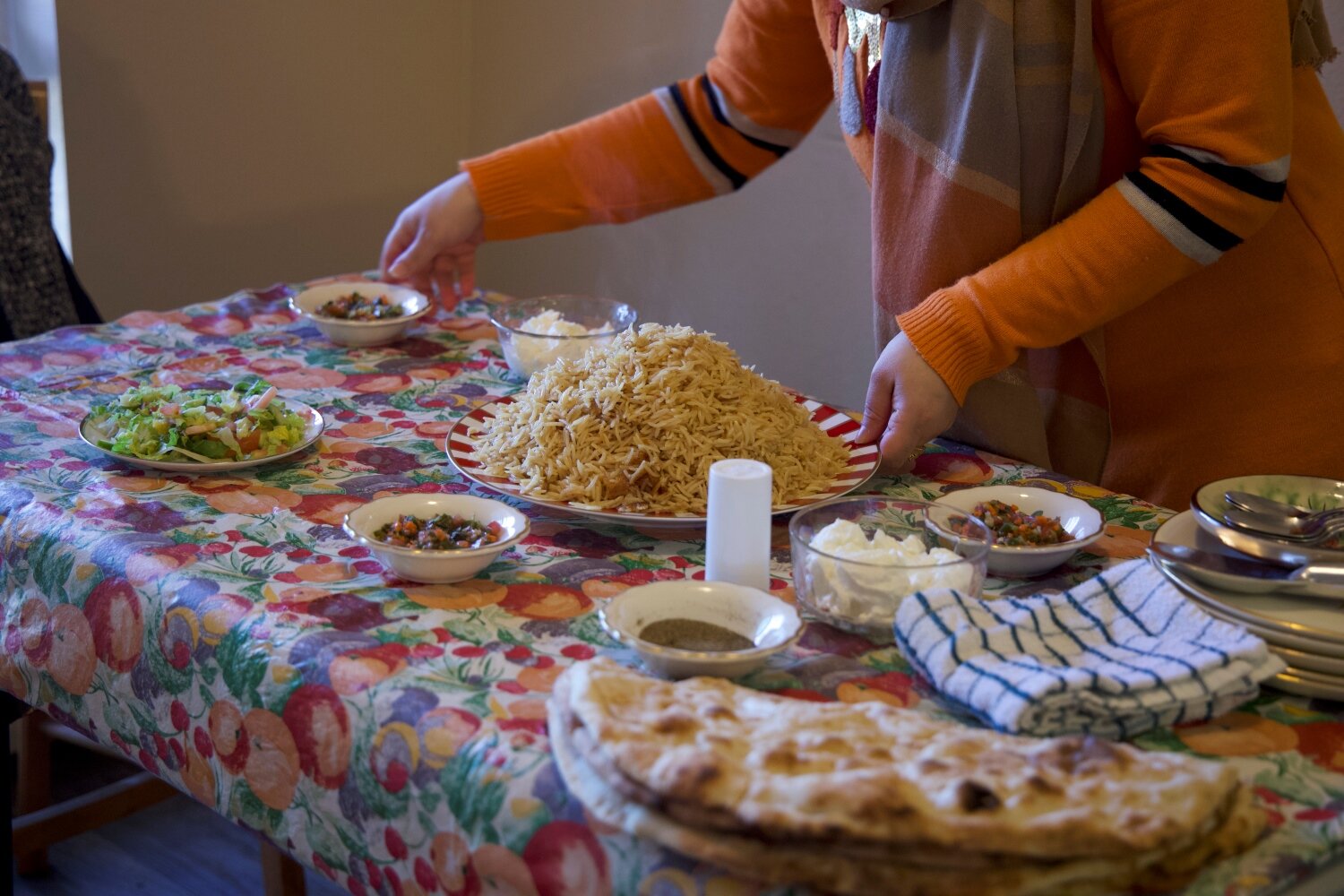
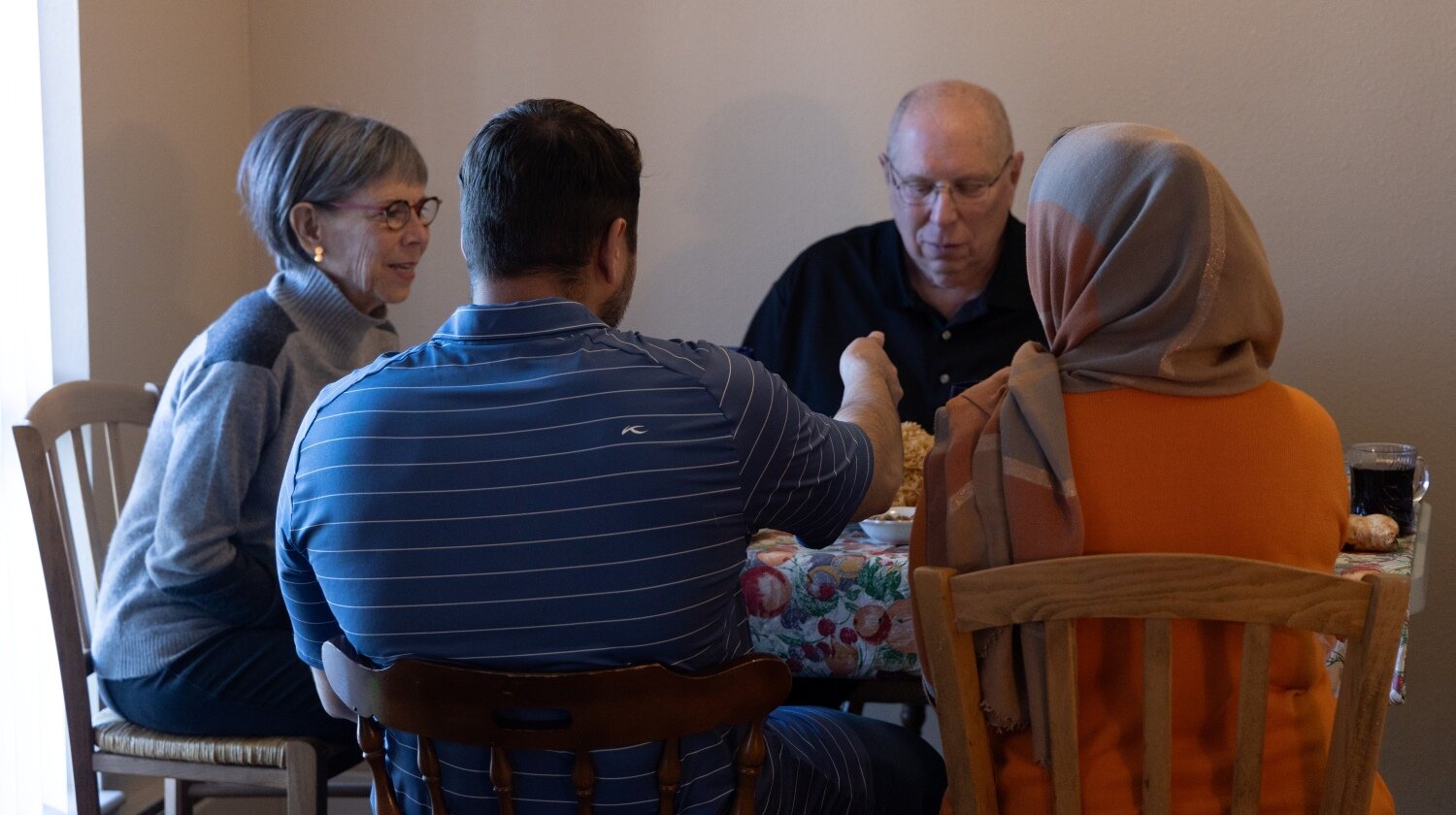
Sweeta and Faisal invited Rosenthal and Mannis to stay for lunch after they dropped off donated items. The couple are halal and buy food at Zamzam, a specialty halal market in Denver.
Photo: Andrea Kramar, Rocky Mountain PBS
After lunch, Faisal shared photos from their wedding album , while Sweeta served tea and cookies and medjool dates – their custom when guests come over.
“We tell them over and over: ‘if anything we do or say is not part of your tradition, please tell us because we're learning from you as well,'” Rosenthal said.
A few streets away, Bibi and her family are finally starting to adjust to life in the U.S. and no longer need the help of the volunteers. Bibi works at Temple Sinai preschool--the same preschool where Sweeta will begin to teach--two days a week and her husband works at the airport five days a week.
Bibi's son, who was nonverbal when he first came to the U.S. because of all the trauma, is finally starting to make sentences at age 4.
“I'm now independent, I have my own car, I have a job. But we are still connected with our mentor family,” Bibi said. “I care so much about them because at the time that I didn't have anything, they were standing by our side and helping us.”
In a switch of circumstances, Bibi now sometimes takes Rosenthal out for lunch and pays. The two have become close friends.
“It’s so gratifying. People thank us all the time. It's ridiculous,” said Rosenthal. “We're the beneficiaries of both the relationships and the good feelings. We joke that we get more out of it than we give,” she said.
Andrea Kramar is the investigative multimedia journalist at Rocky Mountain PBS. Andreakramar@rmpbs.org.
Related video
Sweeta and Faisal miss their families. “Sweeta's crying every day. I don't know what to do,” said Faisal.
Photo: Andrea Kramar, Rocky Mountain PBS